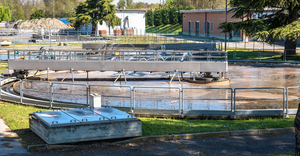High court ruling in emissions case could ensnare waste industry.
February 1, 2011
Midway through the 1933 comedy film “Duck Soup,” Rufus T. Firefly (Groucho Marx), head of state in the make-believe country of Freedonia, leans out of his office window after hearing Chicolini (Chico Marx), a noisy peanut vendor out in the street. “Do you want to be a public nuisance?” Firefly asks. “Sure,” Chicolini answers. “How much does the job pay?”
Where land is abundant and people are few and far between, what one does on one’s own property may not cause a stir. Population growth and industrialization, however, produce conditions where members of the public can suffer a common injury from activities that interfere with their rights as citizens.
Are you aware that air emissions and other pollutants escaping from your waste facility could create liability problems? By the way, it’s usually no defense to claim that you’re fully meeting your permit responsibilities.
A public nuisance is typically defined as doing (or failing to do) something that injures or damages the safety, health or morals of the public in general. According to 18th Century British jurist William Blackstone, a public nuisance is “such an inconvenience or troublesome offence, as annoys the whole community … , and not merely some particular person.”
Beginning in medieval England, the Crown itself issued criminal writs to punish or abate nuisances. By the 16th Century, English courts were resolving these conflicts as civil matters. The resulting “judge-made” nuisance doctrines became yet another dimension of the common law, which was transplanted into colonial America and later influenced the jurisprudence of the United States.
These days, a public nuisance lawsuit remains a civil action, but, harking back to when the sovereign himself meted out punishment, it is typically filed by a public prosecutor. Besides a judgment for money damages, the action seeks control or abatement of the offensive activity by means of an injunction and specific remedial steps.
In December, the U.S. Supreme Court agreed to hear an appeal by electric power companies on the question of whether they must face a nuisance suit by states seeking a reduction in carbon dioxide emissions. The parties will present their oral arguments in April, and a decision is likely before the high court’s term ends in late June.
Connecticut, along with seven other states and two privately funded land trusts, brought a public nuisance action against the five largest U.S. electric utility companies. The plaintiffs sought injunctive relief in the form of emissions limits on the utilities’ facilities. In 2005, a federal district court held that applying public nuisance law to the problem of climate change presented a non-justiciable political question and dismissed the case. Last year, an appeals court overturned the decision, inviting climate nuisance cases into the courthouse [Connecticut v. Am. Elec. Power Co., 582 F.3d 309 (2d Cir. 2009)].
A high court decision will determine what role, if any, the courts have in adjudicating climate change. Few believe that the courts are an appropriate forum for developing climate policy. But for the foreseeable future, the question is whether the traditional common law can fill in for Congress’ failure to take more comprehensive action.
For their part, the states contend, and the Second Circuit agreed, that common law nuisance claims are controversies that courts historically have handled and that the common law provides basic policy parameters that can be applied to new and evolving circumstances.
Depending on how the justices rule, waste facility owners could begin to feel the heat from nuisance lawsuits demanding relief from greenhouse gas emissions and from whatever else might annoy the neighbors.
[American Electric Power Company v. Connecticut, S.Ct., No. 10-174]
Barry Shanoff is a Rockville, Md., attorney and general counsel of the Solid Waste Association of North America.
The legal editor welcomes comments from readers. Contact Barry Shanoff via e-mail: [email protected].
Related Stories
About the Author(s)
You May Also Like




